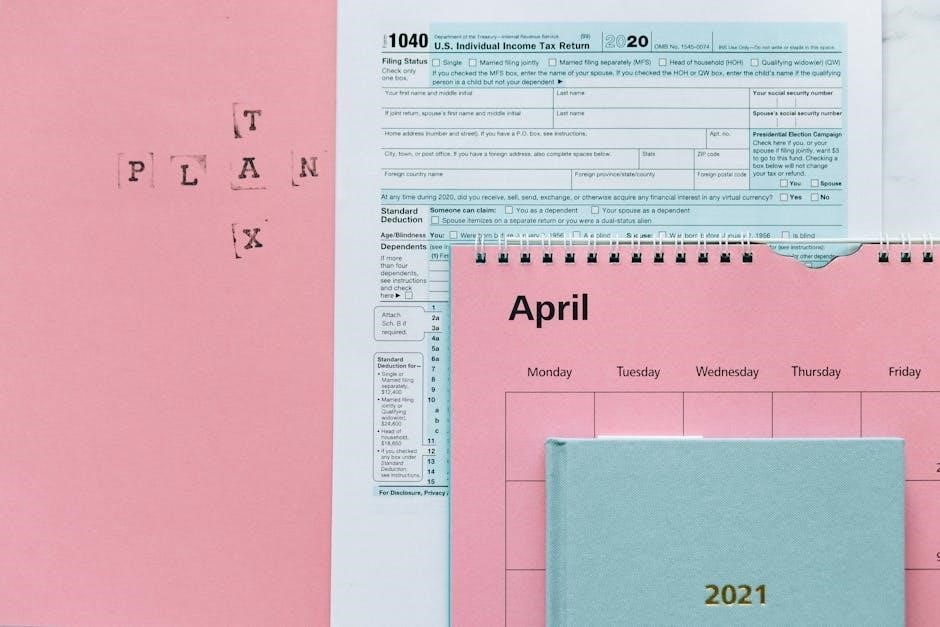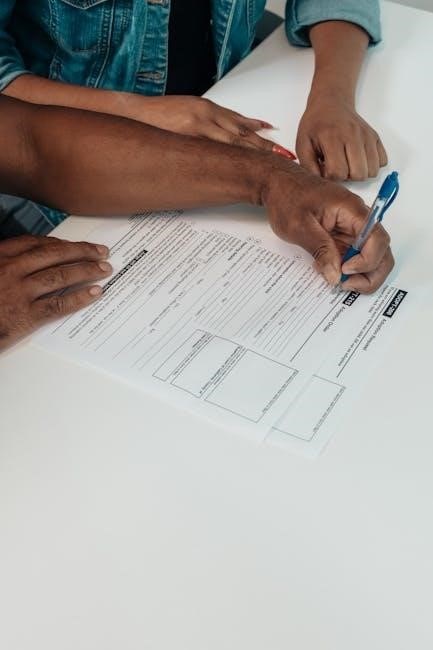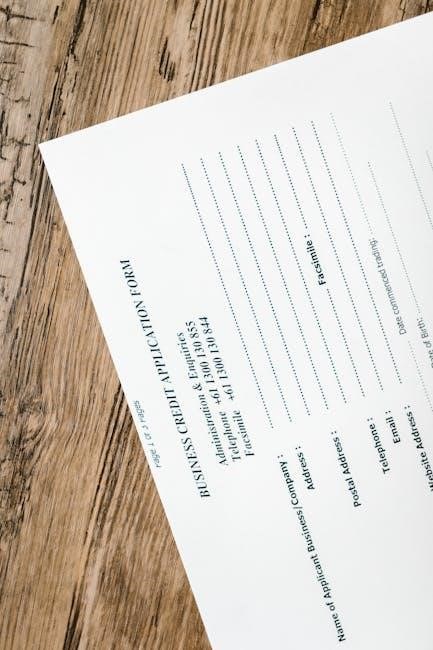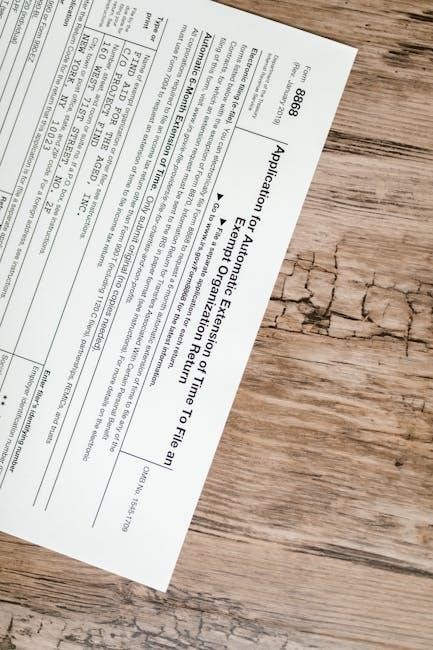sixth form application deadline 2024
Understanding Sixth Form application deadlines is crucial for a smooth transition to post-16 education. Missing these dates can limit your options‚ so staying informed is essential. Deadlines vary by institution‚ with many schools setting cutoffs in late autumn or early winter for the academic year 2024/25. Early applications are often encouraged for competitive programs‚ while late submissions may still be accepted under specific circumstances. This section guides you through key timelines to ensure your application is submitted on time and meets all requirements.
Overview of the Importance of Meeting Deadlines
Meeting Sixth Form application deadlines is critical to secure your place in your chosen institution. Missing deadlines can result in limited course availability or even rejection‚ especially for competitive programs. Schools and colleges often allocate spaces on a first-come‚ first-served basis‚ making timely submissions essential. Late applications may still be accepted but are not guaranteed consideration. Additionally‚ early deadlines for top schools emphasize the need for prompt action. GCSE results are a key factor in sixth form admissions‚ and submitting applications on time ensures your academic achievements are fully considered. Treat deadlines as priorities to avoid disappointment and ensure a smooth transition to post-16 education.
Key Dates for Sixth Form Applications in 2024
For Sixth Form applications in 2024‚ key dates vary by institution but generally follow a structured timeline. Most schools open their application portals in early autumn‚ with deadlines typically falling between October and February. Some competitive schools set earlier deadlines‚ often by late November or early December‚ to manage high demand. Interviews for applicants usually take place between January and March‚ with offers being sent out shortly after. Final decisions and confirmations are typically required by April or May. Missing these deadlines can result in limited course availability or late application fees. It’s essential to check specific school websites for exact dates‚ as they can differ significantly. Tracking these timelines ensures a smooth application process and avoids last-minute complications.

Understanding Sixth Form Entry Requirements
Sixth Form entry requirements vary by institution‚ typically involving a mix of GCSE grades‚ subject-specific criteria‚ and sometimes interviews or references. Meeting these standards is essential for admission.
GCSE Grades and Their Impact on Sixth Form Applications
GCSE grades play a pivotal role in determining eligibility for Sixth Form admission. Most institutions require students to achieve specific grades‚ often ranging from 4 to 5 or higher‚ depending on the school’s standards. These grades are used to assess a student’s academic potential and suitability for A-level or vocational courses. High-demand subjects‚ such as sciences or mathematics‚ may require higher grades. Additionally‚ some schools mandate a minimum overall GCSE score or specific grades in relevant subjects for certain programs. Meeting these criteria is essential for securing a place‚ as they demonstrate a student’s readiness for advanced study. Each school’s entry requirements vary‚ so it’s crucial to review their guidelines carefully to ensure eligibility. Strong GCSE performance not only opens doors to more opportunities but also influences subject choices at Sixth Form level.
Subject-Specific Entry Requirements
Subject-specific entry requirements are crucial for Sixth Form applications‚ as they vary significantly between institutions and courses. Many schools set minimum GCSE grades for specific subjects to ensure students are adequately prepared for the demands of A-level or BTEC studies. For example‚ sciences and mathematics often require higher grades due to their complexity‚ while languages may mandate a strong performance in GCSE English or the target language. Vocational courses might have more flexible entry criteria but still require relevant experience or skills. It’s essential to research each school’s requirements to align your subject choices with their expectations. Meeting these criteria ensures a smoother transition and a higher likelihood of acceptance into your preferred courses. Always check the prospectus or website for detailed information on subject-specific requirements to make informed decisions.
Minimum GCSE Scores for Popular Subjects
For popular subjects like Mathematics‚ Sciences‚ and English‚ Sixth Forms typically require specific GCSE grades to ensure students are well-prepared. Mathematics often demands a grade 7 or higher‚ while subjects like Biology‚ Chemistry‚ and Physics may require at least a grade 6. English Literature and Language often mandate a grade 6 or above due to their emphasis on analytical and communication skills. For vocational courses‚ such as BTECs‚ requirements may be more flexible‚ but relevant GCSEs in related subjects are still important. Meeting these minimum scores is essential for securing a place in your chosen subjects. Always check the specific requirements for your desired courses to ensure eligibility and plan your application accordingly. This ensures a smooth transition to Sixth Form and sets you up for success in your studies.

The Application Process for Sixth Form
The application process involves submitting an online form‚ often requiring personal details‚ academic records‚ and subject preferences. Ensure all required documents are uploaded on time to avoid delays.
How to Choose the Right Sixth Form College
Choosing the right Sixth Form college involves considering several factors‚ including academic offerings‚ location‚ and extracurricular opportunities. Start by researching schools that align with your career goals and subject interests. Check their entry requirements to ensure your GCSE grades meet their standards. Visit open days or virtual tours to gauge the atmosphere and facilities. Consider class sizes‚ teaching styles‚ and support services‚ such as academic guidance and mental health resources. Additionally‚ review the range of subjects available‚ as some colleges specialize in specific areas. Finally‚ read student testimonials and consult with teachers or mentors to make an informed decision. This step is crucial for ensuring a successful and fulfilling Sixth Form experience.
Steps to Complete the Application Form
Completing a Sixth Form application form requires careful attention to detail and organization. Start by visiting the college or school’s website to access the application portal. Review the entry requirements to ensure you meet the criteria. Gather necessary documents‚ such as GCSE certificates and references‚ before beginning. Fill in personal details‚ academic history‚ and subject choices accurately. Write a clear and concise personal statement highlighting your strengths and aspirations. Double-check for errors and ensure all sections are complete. Submit the form well before the deadline to avoid delays. Some institutions may require an interview‚ so prepare for this step as well. Following these steps ensures a smooth and successful application process.
Required Documents for Sixth Form Applications
When applying to Sixth Form‚ you will typically need to provide several key documents to support your application. These include your GCSE certificates or predicted grades‚ a copy of your birth certificate or passport‚ and proof of residency if required. Some institutions may also ask for a reference from your current school or a personal statement outlining your academic goals and aspirations. Additionally‚ a passport-sized photo may be requested for identification purposes. Ensure all documents are up-to-date and meet the specific requirements of the college or school you are applying to. Submitting incomplete or incorrect paperwork can delay your application‚ so double-check everything before sending it in. Having these documents ready in advance will streamline the application process and help you meet deadlines effectively.

Deadlines for Sixth Form Applications in 2024
Deadlines for Sixth Form applications in 2024 vary by institution‚ with many closing in late autumn or early winter. Early applications are often encouraged for competitive programs‚ while late submissions may still be accepted under specific circumstances. This section guides you through key timelines to ensure your application is submitted on time and meets all requirements.
General Deadline for Sixth Form Applications

The general deadline for Sixth Form applications in 2024 typically falls between late October and early December‚ depending on the institution. Many schools and colleges set their deadlines around the end of November‚ while others may extend into December. It is crucial to check the specific deadline for your chosen institution‚ as missing it may result in your application being rejected or considered late. Early submissions are often encouraged to avoid last-minute issues. Ensure all required documents and information are prepared well in advance to meet the deadline. Late applications may still be accepted in some cases‚ but this is not guaranteed. Plan carefully to secure your place for the 2024 academic year.
Early Application Deadlines for Competitive Schools
Competitive schools often set earlier deadlines for Sixth Form applications to manage high demand. These deadlines can fall as early as mid-October to late November 2023 for entry in 2024. Applying early ensures consideration for oversubscribed programs and popular subjects. Some institutions may also require interviews or additional assessments‚ necessitating earlier submissions. It is advisable to submit applications well before the stated deadline to avoid technical issues. Missing the early deadline may reduce your chances of securing a place at a top choice school. Always verify the specific timeline for your desired institution‚ as these dates can vary significantly. Early planning and preparation are key to meeting these tight deadlines successfully.
Extended Deadlines and Late Applications
Some schools offer extended deadlines for Sixth Form applications‚ allowing students to submit their forms after the official cutoff date. These extensions are typically granted under specific circumstances‚ such as unforeseen delays or exceptional personal reasons. Late applications may still be considered if spaces are available‚ but this is not guaranteed. It is essential to contact the school directly to inquire about their policy on late submissions. Keep in mind that missing the original deadline may limit your options‚ as popular courses or institutions may already be full. Late applicants should be prepared to provide a valid reason for the delay and may face a more competitive selection process. Always aim to submit your application by the stated deadline to avoid unnecessary complications.

Preparing for Sixth Form Interviews
Preparing for Sixth Form interviews involves researching the institution‚ practicing common questions‚ and showcasing your strengths. Stay calm‚ be honest‚ and demonstrate enthusiasm for your chosen subjects.
Common Interview Questions for Sixth Form Applicants
Common interview questions for Sixth Form applicants often focus on academic strengths‚ career aspirations‚ and reasons for choosing specific subjects. Be prepared to discuss your GCSE results‚ why you selected certain A-levels‚ and how they align with your future goals. Questions like‚ “Why do you want to study this subject?” or “How do you plan to manage your workload?” are frequent. Additionally‚ interviewers may ask about your extracurricular activities‚ leadership experiences‚ or examples of teamwork. It’s important to be specific and highlight your passion for learning. Practicing these types of questions beforehand can boost your confidence and help you present yourself effectively. Show genuine interest in the Sixth Form and its community to make a positive impression.
How to Prepare for a Sixth Form Interview
To prepare for a Sixth Form interview‚ research the institution and familiarize yourself with their values and courses. Review your GCSE grades and extracurricular activities‚ as these are often discussed. Practice answering questions about your strengths‚ weaknesses‚ and future goals. Prepare thoughtful questions to ask the interviewer‚ such as the structure of your chosen courses or extracurricular opportunities. Mock interviews with teachers or mentors can help build confidence. Dress appropriately to make a positive impression. Stay calm‚ be honest‚ and demonstrate enthusiasm for your chosen subjects and the Sixth Form community. This preparation will help you present yourself effectively and confidently during the interview process.
What to Expect During the Interview Process
During a Sixth Form interview‚ you can expect a structured conversation focusing on your academic achievements‚ career aspirations‚ and personal interests. The interviewer will likely discuss your GCSE results‚ extracurricular activities‚ and reasons for choosing specific subjects. Be prepared to explain why you’re interested in the Sixth Form and how you plan to contribute to the school community. The conversation may also cover your understanding of the courses you’ve applied for and your long-term goals. The tone is typically formal but conversational‚ aiming to assess your suitability for the program. Stay calm‚ be honest‚ and demonstrate enthusiasm. The process is an opportunity for both you and the institution to gauge compatibility and potential for success.

Personal Statement and Application Tips
A strong personal statement is essential for a successful Sixth Form application. Ensure it clearly outlines your academic goals‚ interests‚ and reasons for choosing specific subjects. Keep it concise‚ passionate‚ and relevant‚ avoiding generic phrases. Tailor it to each institution and proofread thoroughly to avoid errors. Highlighting extracurricular achievements and skills also showcases your suitability. A well-crafted statement demonstrates your commitment and potential‚ making your application stand out to admissions teams.
Writing a Strong Personal Statement for Sixth Form
Your personal statement is a critical component of your Sixth Form application‚ showcasing your academic aspirations‚ subject interests‚ and personal qualities. It should reflect your passion for the subjects you wish to study and demonstrate how they align with your future goals. Be specific about your achievements‚ skills‚ and experiences‚ avoiding generic statements. Highlighting extracurricular activities or work experience can also strengthen your application. Ensure your statement is well-structured‚ concise‚ and free of errors. Avoid jargon and overly complex language; instead‚ use a clear and sincere tone. Finally‚ tailor your statement to each institution and seek feedback from teachers or mentors to refine it effectively.
Top Tips for a Successful Sixth Form Application
To ensure a successful Sixth Form application‚ start by researching colleges thoroughly and understanding their entry requirements. Begin your application early to avoid last-minute stress and meet deadlines promptly. Tailor your personal statement to highlight your strengths‚ interests‚ and career aspirations. Seek feedback from teachers or mentors to refine your application. Attend open evenings or virtual tours to gain insights into the college environment. Prepare for interviews by practicing common questions and showcasing your enthusiasm for your chosen subjects. Double-check all details before submission and ensure required documents are ready. Stay organized‚ track deadlines‚ and follow up if necessary. By being proactive‚ well-prepared‚ and informed‚ you can maximize your chances of securing a place at your preferred institution.
Common Mistakes to Avoid in Sixth Form Applications
One of the most common mistakes in Sixth Form applications is procrastination‚ leading to rushed submissions. Many students overlook the importance of thoroughly researching the school and its courses‚ resulting in mismatched choices. Others fail to proofread their personal statements for grammar and spelling errors‚ which can create a negative impression. Neglecting to seek feedback from teachers or mentors is another oversight‚ as it can lead to missed opportunities for improvement. Additionally‚ some applicants ignore entry requirements‚ applying to subjects or institutions for which they are not qualified. Finally‚ failing to meet deadlines or misunderstanding the application process can disqualify an otherwise strong candidate. Avoiding these pitfalls ensures a more polished and effective application.

Post-Application Process and Next Steps
After submitting your application‚ you’ll typically receive a confirmation email. Many schools offer online portals to track your application status. Interviews may be scheduled‚ and induction days are often held in summer to prepare students for Sixth Form. Stay informed about deadlines and next steps to ensure a smooth transition.
What Happens After Submitting Your Application
After submitting your Sixth Form application‚ you’ll typically receive a confirmation email. Many schools provide an online portal to track your application status. If required‚ interviews will be scheduled‚ and you may need to provide additional documents. Once a decision is made‚ you’ll receive an offer or feedback. If accepted‚ you’ll be invited to an induction day to meet teachers‚ tour facilities‚ and finalize your subjects. This is also an opportunity to ask questions and prepare for the transition. Keep an eye on your email for updates and ensure you complete any necessary steps by the deadlines provided. Understanding this process helps you stay prepared and informed throughout the post-application journey.
How to Track the Status of Your Application
After submitting your application‚ most schools provide an online portal to track its progress. Log in to the institution’s website using your account credentials to monitor updates. You’ll typically receive a confirmation email with instructions on how to access this system. Some colleges also offer email updates or SMS notifications. If you haven’t heard back‚ contact the admissions team directly. Once processed‚ your application status will show as “under review‚” “interview scheduled‚” or “offer made;” This system ensures transparency‚ allowing you to stay informed about your application’s progress. Regularly checking your portal and email is essential to receive timely updates and respond to any requests promptly.
Preparing for Sixth Form Induction Day
Induction Day is your first opportunity to familiarize yourself with the sixth form environment and meet key staff and peers. Research the schedule beforehand to understand the activities planned‚ such as subject taster sessions or icebreakers. Bring necessary documents‚ like your GCSE results or completed forms‚ and wear appropriate attire as specified by the institution. Organize any required materials‚ such as stationery or a laptop‚ to ensure you’re prepared for orientation tasks. Mentally prepare by reviewing your subject choices and considering any questions you may have for tutors or current students. A positive attitude and proactive engagement will help you make the most of this introductory experience and set a strong foundation for your sixth form journey;
